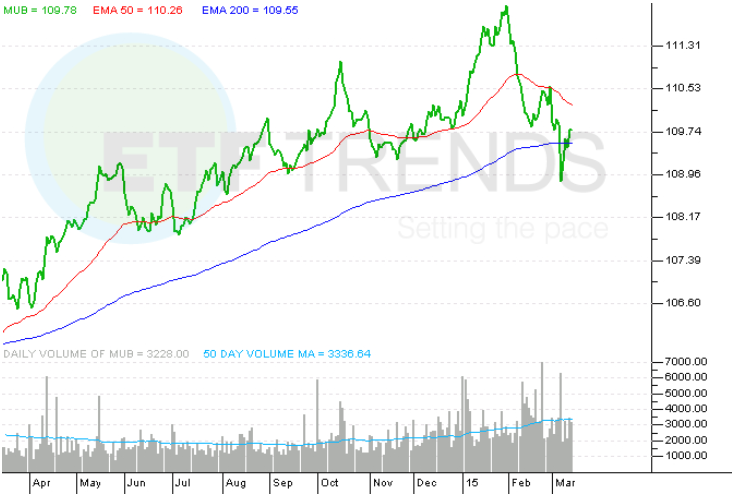Muni Bond ETFs Look Attractive After Pullback
After posting their first monthly decline in over a year, municipal bond exchange traded funds may offer a decent buying opportunity.
In February, the iShares National AMT-Free Muni Bond ETF (MUB) fell 1.0%, SPDR Nuveen Barclays Municipal Bond ETF (TFI) declined 1.6% and Market Vectors Intermediate Municipal Index ETF (ITM) decreased 1.7%. Over the past year, MUB rose 5.4%, TFI gained 5.8% and ITM increased 5.7%. [New Issues, Rate Concerns Cause Muni ETFs to Tumble]
Now that munis have experienced a pullback, BlackRock argues that municipal debt investors should view the recent volatility as a buying opportunity, reports Amay Stone for Barron’s.
“One of our themes is living with volatility,” Peter Hayes, who runs the municipal bonds group at BlackRock, said in the article. “We recommend taking advantage of any selloff to lock in a better entry point.”
March may be a good entry point after the S&P Municipal Bond Index dipped 0.9% in February. Hayes argues that the recent decline was not unexpected after munis posted monthly gains for 13 consecutive months. Additionally, the municipal bond ETFs are now back above their long-term trends, trading above their 200=day exponential moving averages.
The recent fall may was not attributed to any dramatic changes in investment sentiment but more as a result of a spike in supply. Municipalities are taking advantage of the falling yields to refinance debt at lower yields, but Hayes believes supply will cool later this year. [Embrace Supply And Consider Staying The Course]
“Muni-to-Treasury ratios remain historically compelling, and recent market action has left munis attractive vs. corporate bonds as well,” Hayes added.
For instance, MUB, which has a 6.26 year duration, shows a tax equivalent 30-day SEC yield of 2.83% for those in the highest income bracket. In contrast, the iShares 7-10 Year Treasury Bond ETF (IEF) , which has a 7.74 year duration, has a 1.93% 30-day SEC yield. Additionally, the iShares iBoxx $ Investment Grade Corporate Bond ETF (LQD) , which has a 8.1 year duration, comes with a 3.07% 30-day SEC yield.
iShares National AMT-Free Muni Bond ETF
For more information on the munis market, visit our municipal bonds category.
Max Chen contributed to this article.
The opinions and forecasts expressed herein are solely those of Tom Lydon, and may not actually come to pass. Information on this site should not be used or construed as an offer to sell, a solicitation of an offer to buy, or a recommendation for any product.

 Yahoo Finance
Yahoo Finance 
